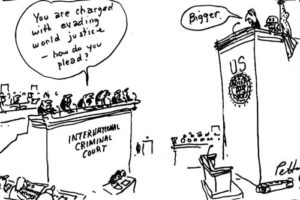The Silent Puppeteer
by Sarah Erickson, J.D
Benjamin B. Ferencz Fellow in Human Rights and Law
In December 2018, I attended the Assembly of States Parties of the International Criminal Court (ASP for my fourth consecutive year. Each year, no matter what the initial agenda, a rallying point seems to develop, either intentionally, like when a new measure is up for adoption, or organically, like when a member state threatens to withdraw from the Court. The vast majority of states parties have always stood behind the Court when some states threaten to withdraw. In 2016 Burundi, The Gambia, and South Africa all threatened withdrawal because they claimed that the Court was targeting African countries. In 2017, the Court’s member states joined forces to activate jurisdiction over the Crime of Aggression. This year, the rallying point came again and again in messages to a country with no representatives at the meeting and that is not a state party: The United States.
ICC President, and excellent orator Chile Eboe-Osuji used every platform and podium he was given over the course of eight days to eloquently remind everyone that recent actions and statements of the US administration towards the Court are not only misguided but demonstrate a harsh deviation from the status of moral global leader. Across his many addresses to the Assembly, and during sessions with civil society members, President Eboe-Osuji quoted the inscription at the foot of the Statue of Liberty, former US Supreme Court Justice Robert Jackson, and former first lady Eleanor Roosevelt, among other influential American figures, in not so subtle nods to the US government’s recent threats against the ICC. Additionally, Assembly President O-Gon Kwon urged members to encourage universality of the Rome Statute by impressing upon non-member states that the Court does not threaten their national sovereignty.
In fact, every member of the Court leadership, as well as almost all States Parties and civil society organization representatives who presented remarks addressed US attacks on the Court, denounced them, and reaffirmed their full faith in and support of the Court’s work. Not every speaker was brave enough to take on the US by name, but the messages came through loud and clear like the representative from the United Kingdom, which is currently under preliminary examination by the ICC Chief Prosecutor for actions of its military in Iraq, who said, “The Court has many critics, including in States which are not Parties to the Statute. Some of their criticism is strident and, in our judgment, misplaced, and we do not share it.” While the statement was not as outwardly strong in its condemnation of the US attacks on the Court, it was an unusually bold and distancing statement from an official representative of one of the United States’ closest allies.
As an American at the Assembly, I was frequently asked for my opinion about my government’s relationship, or lack thereof, with the Court and how things are going in the country in general. It was clear that the feud between the Court and the US government is happening within a fish bowl. Everyone is looking in on it and waiting with bated breath to find out what will happen next. It is a perfect but unfortunate example of how global politics and diplomacy really work, because as a non-state party with zero representation or interaction with the Court, what United States officials say about the Court should theoretically have no influence on the Court. But the United States clearly does have an impact.
This ASP was in some ways more subdued that the three previous meetings, with no large-scale agenda items or fiery internal conflicts. However, for me personally, it was the most impactful session I’ve attended. I learned first- hand how the actions of my country’s government have a ripple effect on the rest of the world, and in that knowledge, I now feel an enormous sense of responsibility. When young people are taken on field trips, the teachers say, “Be on your best behavior because you are representing the whole school (or town etc.).” I don’t think I ever really internalized what that meant until now. I now have a much greater understanding of why it is so important to leave a good impression on the rest of the world. They are listening. They are watching. What we, as Americans, say and do matters to them not just at the government official and celebrity level of interactions, but in the everyday interactions between average Americans and average people everywhere.




Leave a Comment